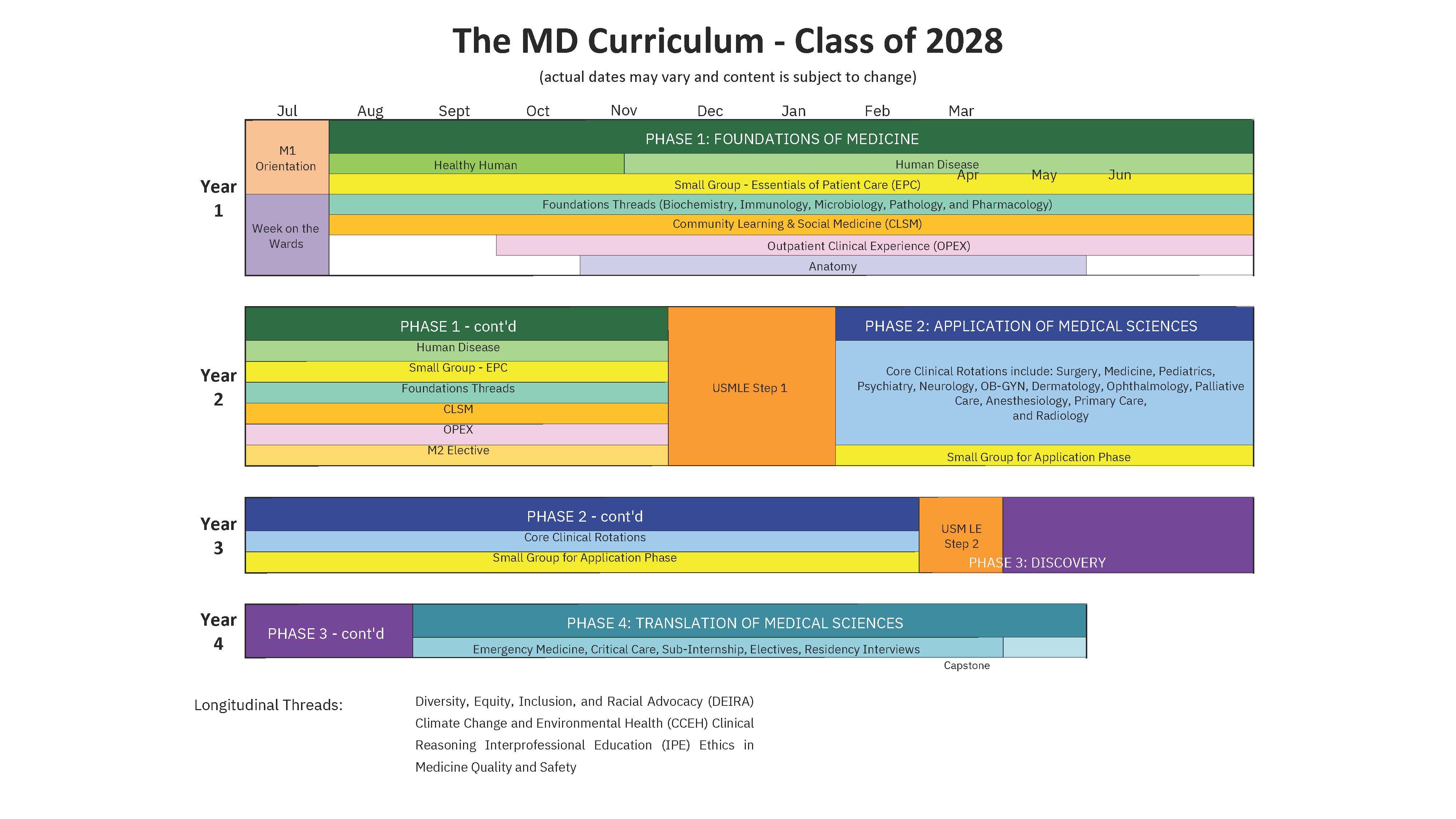
Four Phases in Four Years - The MD Curriculum

Phase 1: Foundations of Medicine (18 months)
Following a week-long shadowing experience, known as “Week on the Wards,” you begin “Healthy Human,” a four-month study of healthy human physiology. During this time, students begin their clinical skills training, meeting twice a week with their small group and small group leader – forming a close relationship with classmates and their faculty mentor early-on. Small group discussions about professionalism, ethics, communication, cultural competency, and other “How to be a Doctor” skills add to the “whole person approach” to medical education.
Using those new skills, you begin seeing patients in an outpatient clinic in the early months of medical school. Reporting for service one afternoon every other week for 12-months, first-year medical students are able to learn, hands-on, from a healthcare team – and their patients – in a longitudinal experience.
Approximately five months into the curriculum, you begin studying human disease in organ systems-based blocks for the duration of the Foundations phase. Anatomy lab also takes place during this time period. Each of 24 dissection tables is equipped with a computer to display cross-sectional imaging, study guides, lecture notes, and other electronic references.
An integral part of the MD student experience is Community Learning and Social Medicine. This required course is 12 months (M1 year) of community engagement with dedicated longitudinal time in a small group alongside a community partner and 18 months (M1 and M2 year) of social medicine curricular work in the classroom around topics of health equity, climate justice and social determinants of health.
Grading is Pass/Fail for the Foundations of Medicine phase of the curriculum.
Upon completion of the formal courses in Foundations, students are given two months of study time for Step 1 of the United States Medical Licensing Exam.
Phase 2: Application of Medical Sciences (12 months)
Providing you with core knowledge of the basic clinical medical and surgical fields, each student will complete required rotations in Surgery, Medicine, Pediatrics, Psychiatry, Neurology, Obstetrics & Gynecology, Radiology, Primary Care, Dermatology, Ophthalmology, Palliative Care, and Anesthesiology.
Students complete these rotations at Emory and Emory-affiliated healthcare facilities throughout the Atlanta area, including:
- Grady Memorial Hospital
- Emory University Hospital
- Emory University Hospital Midtown
- Children’s Healthcare of Atlanta at Egleston
- Children’s Healthcare of Atlanta at Hughes Spalding
- Wesley Woods Center and Geriatric Care Hospital
- Atlanta Veterans Affairs Medical Center
- The Emory Clinic (multiple sites around Atlanta)
- Multiple non-Emory primary clinical sites in and around Atlanta
During the Application phase, you'll still regularly meet with your small group to further develop your professional identity and to process and reflect on their clinical experiences.
Phase 3: Discovery (5 months)
The Discovery phase is a structured time for you to conduct a hypothesis-driven research project under the direction of a faculty member. While the Discovery project must be a scientific inquiry based in Medicine, you are able to combine your interests in other areas, such as creative writing, public health, community development, education, or health policy, into their project. Some students are also able to include an international experience in their Discovery project. This is a critical opportunity for you to renew your creative energies and explore a new facet of medicine under the tutelage of an Emory faculty member.
During Discovery, medical students work full time on their projects with no other commitments except occasional seminars or workshops relevant to their research. Many students publish their Discovery work in peer-reviewed scientific journals and all students present their Discovery project at Medical Student Research Day in the fourth year.
Phase 4: Translation of Medical Sciences (9 months)
This phase prepares each individual for the transition to physician. Required senior rotations include Emergency Medicine, Critical Care Medicine (ICU), and a sub-internship in Surgery, Medicine, or Pediatrics; there is sufficient time for electives or away-rotations during this year. The Translation phase concludes with a required month-long Capstone course that offers carefully designed lectures, workshops, panel discussions, and exercises which equip the soon-to-be-graduate with the practical skills and information that will be crucial to their success as residents.

